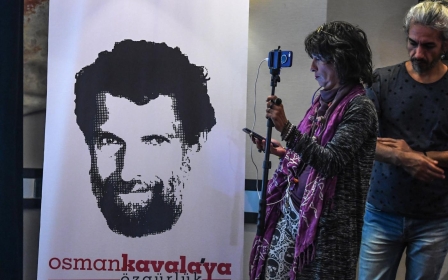Osman Kavala: Turkish philanthropist sentenced to life in prison after four-year detention

Philanthropist and campaigner Osman Kavala has been sentenced to life in prison by a Turkish court, over claims he helped conspire to overthrow the government.
Kavala, who has spent more than four years in jail without a conviction, was given the verdict at Istanbul's 13th Heavy Penal Court on Monday. He was convicted alongside a number of activists involved in the 2013 Gezi Park protests, but they received shorter 18-year sentences.
According to AFP, the panel of three judges ruled there was not enough evidence to convict the 64-year-old on a separate espionage charge.
'The verdict makes a mockery of the judicial process'
- Milena Buyum, Amnesty International
The businessman, a founder of a number of organisations advocating inter-communal dialogue and democratic reforms in Turkey, was detained over allegations of involvement in the Gezi Park protests and the 2016 coup attempt.
In 2019, the European Court of Human Rights ruled that Kavala's detention was political and called for his immediate release, a request which has been repeated numerous times but has so far been ignored by Turkey.
New MEE newsletter: Jerusalem Dispatch
Sign up to get the latest insights and analysis on Israel-Palestine, alongside Turkey Unpacked and other MEE newsletters
Milena Buyum, a senior campaigner with Amnesty International, told Middle East Eye that the verdict and charges had been "politically motivated."
"The files are absent of any evidence at all that could justify an aggravated life sentence," she said, referring to the sentence, which prohibits any chance of release short of a presidential pardon or the sentence being overturned.
She said the trial had been a "relentless travesty of justice and with this outcome, it has reached really epic proportions".
"The verdict makes a mockery of the judicial process," she said.
The verdict was greeted with outrage from rights groups on social media.
Sarah Leah Whitson, executive director at the human rights organisation Dawn, described the verdict as "devastating".
"The most baseless, absurd, cruel trial I've ever followed in my life," she tweeted. "I stand with Osman."
Eren Keskin, vice-president of the Human Rights Association (IHD), tweeted that the verdict was "unbelievable" and that the sentences had "no legal basis".
Supporters of Kavala and the Gezi Park protesters chanted "Everything is Taksim, everything is resistance", following the verdict inside the courtroom, referring to Taksim Square in Istanbul which became a central gathering point for the 2013 protests:
Monday's court hearing was plagued with technical problems, with muffled sound and a breakdown in Kavala's video link from Silivri prison.
A number of defendants, such as Mucella Yapici, Cigdem Mater, Can Atalay and Tayfun Kahraman, were present in the courtroom, while others - such as American academic Henry Jack Barkey - were tried in absentia.
Speaking to the court, Kavala described the whole process against him as a "judicial assassination" and described the accusations as "conspiracy theories drafted on political and ideological grounds".
1,637 days in jail
What began as a May 2013 protest against the bulldozing of Gezi Park, one of Istanbul's last green spaces, eventually spiralled into widespread anti-government demonstrations.
Millions took to the street in opposition to the policies of then-Prime Minister Recep Tayyip Erdogan, citing increasing authoritarianism, gentrification, corruption and the erosion of the country's secular values.
Erdogan and other officials claimed Kavala was the primary instigator of the protests and was conspiring the overthrow the elected government.
Kavala was initially prosecuted for supporting the Gezi Park protests but was later acquitted of these charges in February 2020.
However, he was immediately taken into police custody again as part of another investigation linked to the July 2016 coup attempt.
Kavala has now been imprisoned for 1,637 days without conviction, provoking harsh condemnation of Ankara both domestically and internationally.
Erdogan has previously branded Kavala the "red Soros of Turkey", in reference to his links to Hungarian-American philanthropist George Soros, whose support of liberal causes makes him a bete noire for many authoritarian-leaning governments.
Kavala's wife, Ayse Bugra, has described his imprisonment as "torture" and has cited concerns about the spread of the coronavirus pandemic in a number of Turkey's prisons.
"To have an idea about what my husband has been subjected to during more than 1,000 days of imprisonment, it is important to know the strange judiciary process through which he was arrested three times, released twice and acquitted once from different charges all based on the same investigation file," she told Middle East Eye in August 2020.
"He stays alone in a cell with a toilet and shower. He shares a small courtyard with another prisoner. He does not complain about the physical conditions and food - but then, he never complains anyway."
Middle East Eye delivers independent and unrivalled coverage and analysis of the Middle East, North Africa and beyond. To learn more about republishing this content and the associated fees, please fill out this form. More about MEE can be found here.





